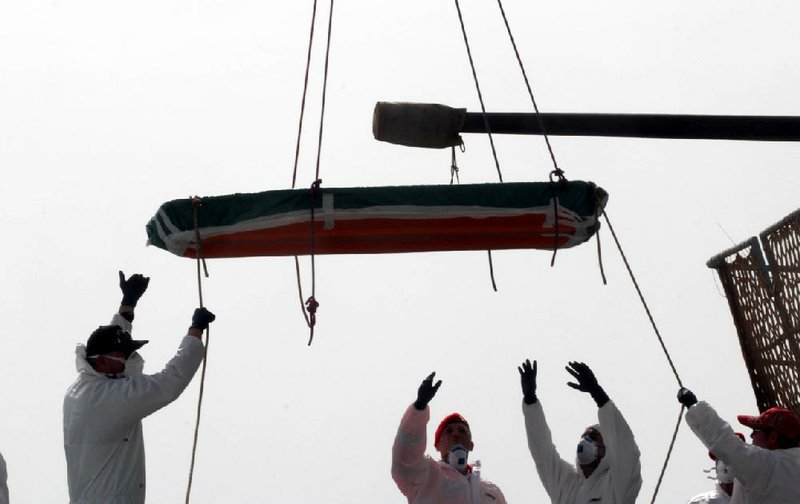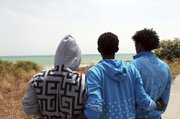POZZALLO, Sicily -- More than 700 migrants likely died in the Mediterranean Sea last week, aid agencies said Sunday, adding that most of them were attempting to flee the Libyan coast for Italy.
The shipwrecks appear to account for the largest loss of life reported in the Mediterranean since April 2015, when a vessel sank with an estimated 800 people trapped inside. Humanitarian organizations say that many migrant boats sink without a trace, with the dead never found, and that their fates are only recounted by family members who report that the passengers didn't make it to Europe.
The shipwrecks raise concerns that Europe is facing another surge of arrivals and a debate over how to handle them. Although the migrant influx tends to slow during the winter and early spring, waters are now growing warmer and calmer. Over the past week, 15,000 people arrived in Italy, many of them pulled to shore in naval or coast guard emergency rescue operations.
"This is the beginning of the peak season," said Federico Fossi, a spokesman for the United Nations' refugee agency. "It's intense."
Fossi cautioned that the death toll from last week was an estimate based on accounts from survivors. But he said that in the span of three days starting Wednesday, there were three shipwrecks about 35 nautical miles from Libya. Photos from one rescue showed a trawler flipping over, throwing hundreds of people into the sea.
In a statement Sunday, the U.N. Children's Fund said many of the migrants who drowned in the past week were believed to be unaccompanied adolescents.
The largest of the shipwrecks occurred Thursday, involving an engineless vessel tied to a fishing boat by rope. About 500 migrants were on the fishing boat; 600 more were on the vessel under tow, Fossi said. When the towed boat began to sink, several dozen people were rescued or managed to climb aboard the other boat. But 400 to 550 died or disappeared.
According to news reports, the captain of the lead boat ordered the cutting of the rope between the two vessels as the second boat began to take on water. Italian police said survivors identified the captain of the boat with the working engine as a 28-year-old Sudanese man. He was arrested after his arrival in Pozzallo, a port town in Sicily. Three other suspected smugglers were arrested, accused of involvement in other crossings, police announced.
Police said the line was at full tension when the captain ordered it cut and that it whipped back, fatally slashing the neck of a female migrant.
"And let me tell you -- this is quite a new thing," Fossi said. "We have never seen that before -- a boat without an engine tied by a rope to the other one. That shows you the human traffickers are becoming really, really greedy and cynical and merciless. Tying a boat to another one is really dangerous."
According to Italian police, 300 people in the hold went down with the second boat when it sank, while around 200 on the upper deck jumped into the sea. About 90 of those were saved, along with about 500 in the first boat.
Carlotta Sami, spokesman in Italy for the U.N. High Commissioner for Refugees, put the number of refugees and other migrants missing in that accident at 550 based on a higher tally of 670 people on board. She said 15 bodies were recovered, 70 survivors were plucked from the sea and 25 swam to the other boat.
Sami also said that an estimated 100 people are missing from a smugglers boat that capsized Wednesday off the coast of Libya.
In a shipwreck Friday, Sami said, 135 people were rescued, 45 bodies were recovered and an unknown number of migrants were still missing.
Because the bodies disappeared in the open sea, it is impossible to verify the number of deaths. Humanitarian organizations and investigating authorities typically rely on survivors' accounts to piece together what happened, relying on overlapping accounts to establish a level of veracity.
Migrants in small vessels have also tried to reach the United Kingdom. The nation's Home Office said Sunday that 20 people -- 18 Albanians and two Britons -- had been rescued overnight from an inflatable boat that started to take on water in the English Channel.
The operation included a search-and-rescue helicopter and lifeboats dispatched from several English ports.
The boat took on water off the coast of Dymchurch, 75 miles southeast of London. The group was traveling in a rigid-hulled inflatable boat, and it took rescuers several hours to locate the small craft after they received word that it was in trouble shortly before midnight Saturday.
After the rescue, the group was taken to Dover to be interviewed by U.K. border officials.
War, repression and government collapse in parts of the Middle East and Africa have caused what some consider to be the biggest migration crisis since World War II. In 2015, more than 1 million asylum seekers and migrants tried to enter European Union countries. This year, nearly 200,000 have arrived on Europe's shores.
On the Mediterranean route, more than 3,700 people died last year. Last week's drownings would push the death toll for this year to more than 2,000.
Hungary has built razor-wire fences along its borders with Serbia and Croatia. An Austrian presidential candidate vowed to "stop the invasion of Muslims." And those who favor a British exit from the European Union say such a move would allow for tighter border control.
Survivors speak
Most of the people aboard the boat that sank Thursday were Eritrean, including many women and children, according to the nonprofit humanitarian group Save the Children. One of the survivors was a 4-year-old girl whose mother had been killed in a traffic accident in Libya just days before, said Giovanna Di Benedetto, a spokesman for the group in Sicily.
"[Last] week was a massacre," Di Benedetto said.
One survivor from Eritrea, 21-year-old Filmon Selomon, said that water started seeping into the second boat after three hours of navigation and that the migrants tried in vain to get the water out.
"It was very hard because the water was coming from everywhere. We tried for six hours, after which we said it was not possible anymore," he said through an interpreter.
He jumped into the water and swam to the other boat before the tow line on the navigable boat was cut to prevent it from sinking when the other went down.
A 17-year-old Eritrean, Mohammed Ali Imam, who arrived last week in another rescue, said one of the survivors told him that the second boat started taking on water when the first boat ran out of fuel.
Habtom Tekle, a 27-year-old Eritrean who survived Thursday's sinking, described people holding on to one another, some dragging others underwater, as the second boat was sinking.
"For me, it was very shocking," he said through an interpreter.
Tekle fled mandatory, open-ended conscription in Eritrea six years ago, spending time in Egypt, Israel, Uganda and Sudan before heading to Libya to take the sea journey to Italy.
"I want to tell the world this way is dangerous for us. Because my brother, sister, family will lose their lives in this channel," Tekle said outside the site where he was taken to have his arrival recorded. "Please help us to have freedom in our country. I don't want to stay here or any place. I want my country with freedom."
Information for this article was contributed by Sarah El Deeb and Colleen Barry of The Associated Press; by Chico Harlan of The Washington Post; and by Jim Yardley and Gaia Pianigiani of The New York Times.
A Section on 05/30/2016


